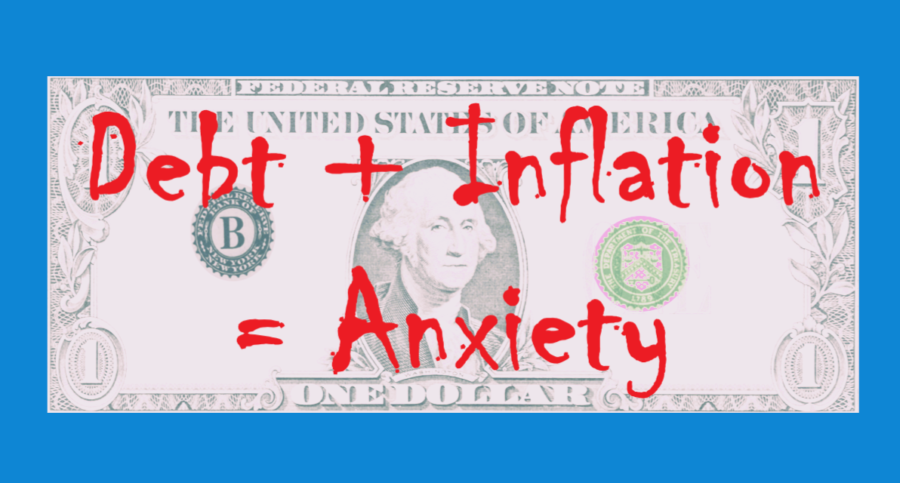There is a direct correlation between inflation and heightened anxiety. This might be a place to become political and say inflation is one political party’s fault. Or it could be the other political party’s fault. But it doesn’t matter.
Or, this might be one of those times when polls could be used to say how many people have anxiety and how many people have anxiety about inflation. But it doesn’t matter. Statistics never lie, and liars always use statistics.
What matters is the anxiety people feel when they are forced to make hard choices, “Do I pay for housing, food, medicine or heating oil?” And also, what matters is the anxiety that results from wondering if their hours at work will be cut, their job will be outsourced to another country or if their job will be eliminated due to AI (artificial intelligence). It really is as basic as that.
Rest assured, if you have anxiety about inflation, you are not alone.
What is Inflation?
According to the International Monetary Fund, inflation is the rate of increase in prices over a given period of time. Inflation represents how much more expensive a relevant set of goods and/or services has become over a period, most commonly a year.
Anxiety as the Result of Debt
Debt is the amount of money someone borrows. There is always a fee, interest, for borrowing money. If you are someone who makes a mortgage payment or buys a car, you are taking on a secured debt. During times of high inflation people may be “underwater” or “upside down”, meaning they owe more on their house than they could sell it for. If you do not make your mortgage payment, the bank will foreclose (remove you as the homeowner). As you can imagine, this can cause anxiety when you fall behind in your mortgage payments because you chose to buy medication or heating oil.
There is also something called unsecured debt. A credit card is an example of an unsecured debit. The amount of credit you can receive and the interest rate you are charged is mostly based on your credit score. A credit score of 850 may get you a credit card with a $10,000 spending limit and lower interest rate, maybe 5%. A credit score of 250 will get you a $1,000 spending limit and a higher interest rate, maybe even as much as 25%.
For many people, feeling like they are “drowning in debt” leads to anxiety.
Debt + Inflation = Anxiety
There can be a fair amount of shame when it comes to not being able to pay your debts on time. It is why people will frequently stuff unopened bills into a junk draw, or immediately delete unopened email payment reminders. If you don’t look at the physical bill or the read email, it doesn’t exist, right?
Today, even people who have done okay financially for years are feeling a pinch they have never felt before. And once you start to fall behind, it becomes harder and harder to make payments and to maintain the lifestyle to which you have become accustomed. Buy that $5 coffee on your way to work with unsecured credit (a credit card) with 25% interest and now your $5 coffee could end up costing you $6.25.
The anxiety of debt + inflation can feel like you are drowning. Perhaps you didn’t get that raise to keep up with the cost of living and you are sliding backwards. And it doesn’t matter if your socioeconomic status is upper, middle or lower.
Your debt can also arise from things that seem out of your control, for example, a job loss, a medical crisis, power outages due to a storm or even gift giving expectations around the holidays.
Effects of Inflation
There are so many anxiety effects of inflation:
- Insomnia, not being able to get to sleep or stay asleep, or waking too early
- Intense feelings, for example, anger, irritability, shame, guilt, embarrassment
- Mental health crisis, increased levels of anxiety and/or depression, uncertainty about the future, suicidal thoughts or actions
- Physical ailments such as headaches, high blood pressure, diarrhea or constipation
- Productivity decreases, burnout, shutting down, withdrawing effort
- Relationship difficulties, since money is a common issue couples argue about
- Social withdrawal because you don’t have the money to go out with friends or go to restaurants
- Unhealthy coping skills, for example, drinking, drugging, gambling, shopping, hypersexualized behavior
- Weight gain or loss, basically disrupting your appetite. Maybe even skipping a meal to save money.
Tips to Combat Inflation Anxiety
High debt and inflation are not new concepts. Just ask people who were alive in the 1920s. However, what is happening now is something that has not happened in more than a generation. People have gotten slack in saving money for “a rainy day”.
There are ways you can combat anxiety due to inflation. You could make a plan:
- Develop a budget based on your income and your monthly expenses. Are there things you need to give up, like Netflix? Eating out? Do you need to get another job?
- You are not alone in having financial anxiety. Share with family members, get them to understand cut backs.
- Find a financial advisor. Consult an expert.
- Plan for something fun.
- If the anxiety and worry become unmanageable, and your symptoms are too overwhelming, consider seeking a mental health professional or family doctor.
Relationships Relearned: Learn. Unlearn. Relearn
To be in a healthy, successful relationship, what you learned in childhood about relationships may need to be unlearned and relearned in a different way as an adult.
You probably learned your spending habits from your parents. Or maybe finances were never discussed in your family of origin. Either way, there is a balance to be maintained.
When you are in a relationship both of you are bringing your family of origin views and perspectives. Maybe both of you need to unlearn your parents’ philosophy of money management and develop your own.
Money issues are one of the leading reasons why relationships fail. And the failure isn’t always due to a lack of money, but how to spend and save it. If you are dealing with financial anxiety, your relationships may fail.
Summary
Focusing on things out of your control always escalates anxiety because you can’t do anything productive with the energy. Focus on what is in your control rather than what you WISH was within your control.
With warmest regards,
Thank you so much for reading this blog. If you enjoyed the content, please check out other blogs at:
https://relationshipsrelearned.com/my-blog/
https://rvingnomads.com/blog/
You can view my available books on my Amazon Authors Page or go to the books tab at the top of this page.
To be notified of future posts, please enter your email address and click on the Subscribe button.












